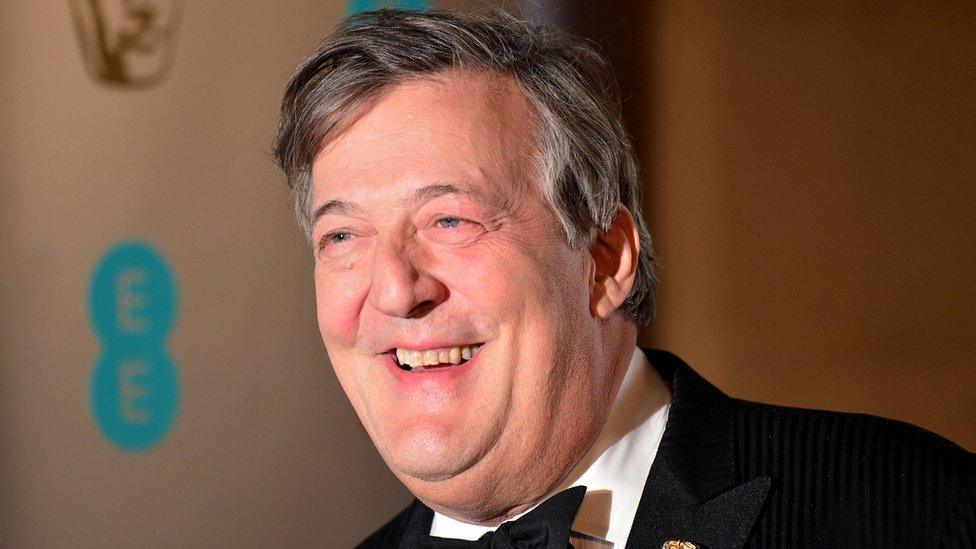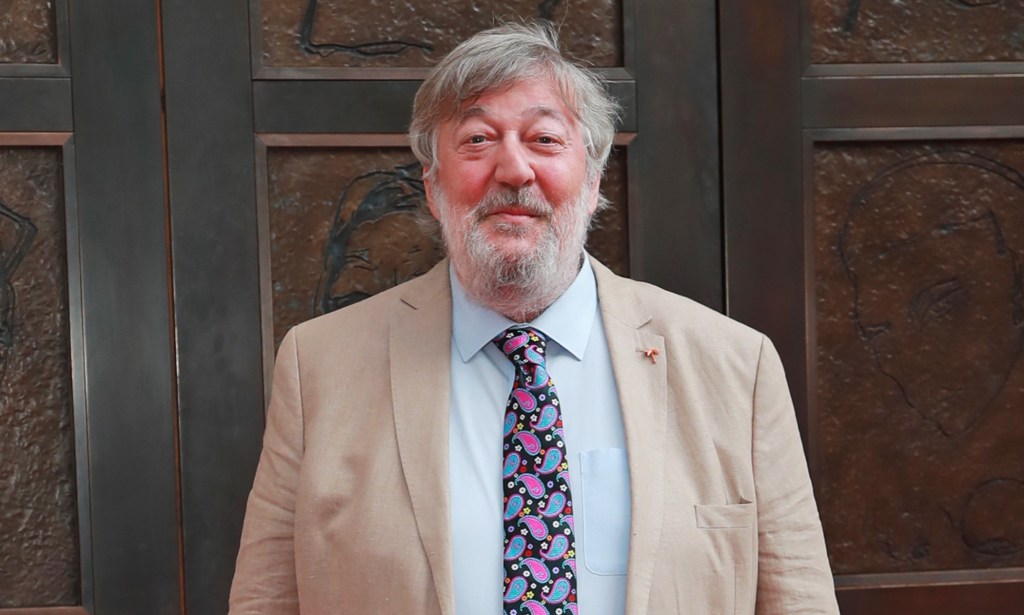Stephen Fry's JK Rowling Stance Sparks Backlash: Trans Community Upset & Stonewall Criticism
Has Stephen Fry, a celebrated figure in the British entertainment industry, truly become a point of contention within the LGBTQ+ community? The answer seems to be a resounding yes, as his recent statements regarding J.K. Rowling and transgender rights have sparked significant controversy and drawn sharp criticism from many quarters.
The crux of the matter lies in Fry's refusal to condemn Rowling's views on transgender issues, despite the author's stance leading to accusations of transphobia and causing deep upset among Fry's transgender and intersex friends. This position has led to a complex and often contradictory narrative surrounding the actor, writer, and broadcaster. Fry, known for his wit, intelligence, and advocacy for queer rights, now finds himself at odds with a significant portion of the community he once championed.
Here's a closer look at the man at the center of this evolving story:
| Category | Details |
|---|---|
| Full Name | Stephen John Fry |
| Born | August 24, 1957 (age 66) in Hampstead, London, England |
| Nationality | British |
| Occupation(s) | Actor, Comedian, Writer, Presenter, Broadcaster |
| Notable Works | "A Bit of Fry and Laurie," "Blackadder," "QI," "Wilde," "V for Vendetta," narrated the Harry Potter audiobooks |
| Awards and Honors | BAFTA Awards, Emmy Awards, Honorary Doctorates, Knighthood (2023) |
| Personal Life | Married to Elliott Spencer since 2015. Openly gay and a vocal advocate for LGBTQ+ rights (until recent events.) |
| Controversies | Comments on J.K. Rowling's views on transgender issues; criticism of Stonewall's approach to transgender rights; accusations of making insensitive jokes. |
| Official Website/Reference | Stephen Fry Official Website |
Fry's stance, articulated on the "Roger Bolton's Beeb Watch" podcast in November 2022, where he stated his desire for both Rowling and the trans community to "retreat," raised eyebrows. This statement, made despite acknowledging that Rowling's views upset his trans friends, seemed to prioritize maintaining a personal relationship with the author over a clear denunciation of her controversial statements. It's a decision that has alienated him from many within the transgender community, a community he has long supported.
His criticism of Stonewall, an established LGBTQ+ rights organization, further fueled the backlash. Describing the charity's stance on transgender issues as "nonsensical" and "stuck in a terrible, terrible, quagmire" demonstrated a shift in his perspective. For many, this seemed to contradict his previous support for the organization and its work advocating for transgender rights. This criticism came as a former employee of Stonewall also questioned Fry on the podcast "Triggernometry".
The core issue is Rowling's views on transgender identity, which have been repeatedly labeled transphobic. Her comments, particularly her 2020 criticism of an article using the term "people who menstruate," ignited a firestorm of criticism. Rowling has consistently denied accusations of transphobia. Fry has consistently defended his right to maintain his friendship with Rowling. However, his reluctance to condemn her views has, in the eyes of many, placed him on the wrong side of the debate.
The issue isn't simply about disagreeing with Rowling's views; it's about the impact of those views. Critics argue that Rowling's statements contribute to a climate of hostility and discrimination against transgender people. By not speaking out against these views, Fry is seen by some as enabling the harm they cause, effectively siding with the wrong side by not speaking out against the racism, sexism, transphobia, etc.
Fry's defense of Rowling is not without its nuances. Some people say Fry wants to see calm in the debate over transgender issues. He has repeatedly stated that he believes Rowling doesn't want to see trans people bullied, alienated, or shut out of society. He has called for an end to the conflict, suggesting a need for dialogue rather than condemnation. Fry's supporters also point to his past work on queer projects and his long-standing support for LGBTQ+ rights, claiming that his intentions, despite the controversial outcome, are not malicious.
The debate around Fry highlights a broader conversation on free speech, allyship, and the complexities of navigating contentious social issues. Is it possible to maintain friendships with those whose views differ from one's own on sensitive topics? When does personal loyalty cross the line into complicity? The case of Stephen Fry serves as a stark reminder of the difficult choices individuals face when dealing with these questions in the public eye.
Another dimension of the controversy involves the role of public figures in these debates. Celebrities often find themselves under intense scrutiny when they express views on social issues. Critics argue that Fry, as a prominent voice in the British public sphere, has a responsibility to use his platform to advocate for marginalized communities. His perceived inaction, in this case, has been met with disappointment and anger. Fry's supporters might say his actions were based on friendship, as a private citizen. But that viewpoint is challenged in a culture where public figures are seen as the standard-bearers of certain values.
Frys actions are often compared to other high-profile public figures, like Stephen King, who has commented in contrast with Fry regarding Rowling's stance on transgender issues. The lack of clarity in his stances has led to both disappointment and confusion, making his position within the LGBTQ+ community highly precarious. The perception of his actions is also influenced by the historical context of the situation, with the LGBTQ+ community still facing discrimination.
The accusations are rooted in Rowling's comments and writings, which have consistently been perceived as excluding and marginalizing transgender individuals. Her arguments have been seen by many as undermining the validity of transgender identities and contributing to a climate of hostility. Fry's failure to take a strong stance against these views has led to accusations of him condoning those views. This is compounded by the fact that Fry, a figure who was seen as an ally, is now perceived by some to be standing on the sidelines or even tacitly supporting those views.
The implications of Frys actions extend beyond his personal relationships and public image. They touch upon the wider discourse on transgender rights and the role of allies in supporting marginalized communities. By not condemning Rowling's views, Fry is seen by some as potentially undermining the hard-won progress made in the fight for transgender equality. His choices have added fuel to the fire, contributing to a situation where open and honest dialogue is increasingly difficult to achieve.
The backlash Fry has received from his fans reflects the high stakes of this debate. People who have admired him for his wit, intellect, and support for LGBTQ+ rights are now expressing sadness and disappointment. They feel betrayed, as though someone they trusted has let them down. This erosion of trust is perhaps the most significant consequence of Fry's choices. The question now is, can he regain the trust of those he has alienated? Can he reconcile his friendships with his responsibility to the community that has long celebrated him?
Fry's situation highlights the complexity of allyship. It's easy to celebrate those who stand with marginalized communities when the cost is low. But true allyship often requires making difficult choices, even when they come at a personal cost. Fry's actions serve as a lesson about the importance of speaking up against injustice, even when its uncomfortable or unpopular to do so. Those who have faced discrimination recognize the importance of true allies, and the cost of silence.
In the coming months and years, Stephen Fry will likely continue to navigate this controversy. How he chooses to respond to the criticisms and the evolving dynamics of the debate will determine his legacy. The situation also presents an opportunity to re-evaluate the nature of allyship and the importance of taking a clear and consistent stance on social issues. The answer remains to be seen. But it is clear that Frys actions have left a lasting mark, impacting his relationships with the transgender community.
Despite Frys previous work on queer projects, and his public persona as a supporter, many in the trans community are now viewing him with suspicion. The controversy surrounding him has sparked important conversations about loyalty, free speech, and the role of public figures in supporting human rights. As a prominent celebrity, Fry now finds himself at the center of discussions. His choices have implications for LGBTQ+ rights and the ongoing struggle for equality.



